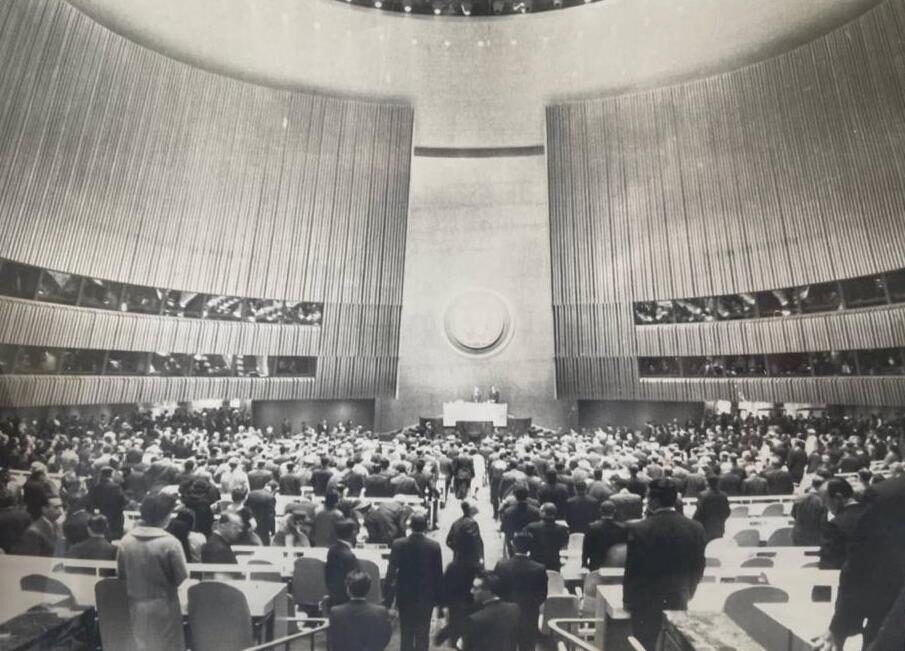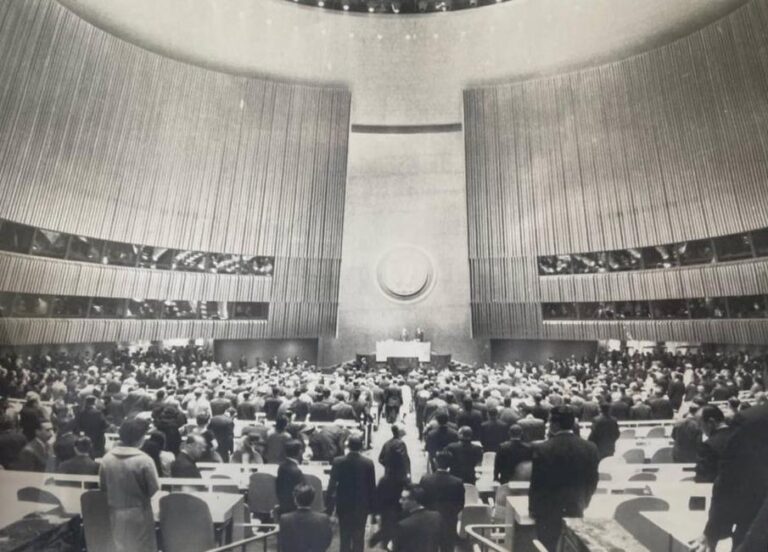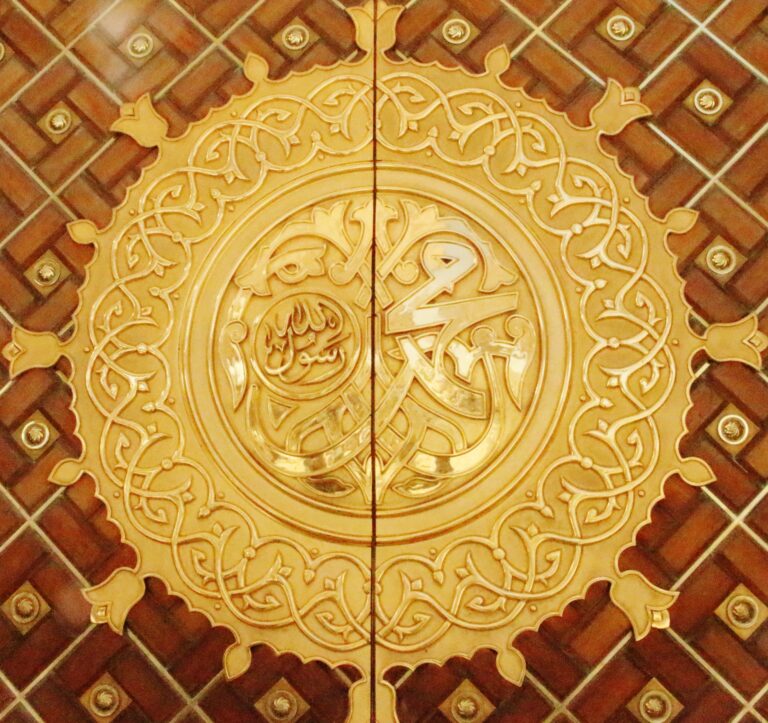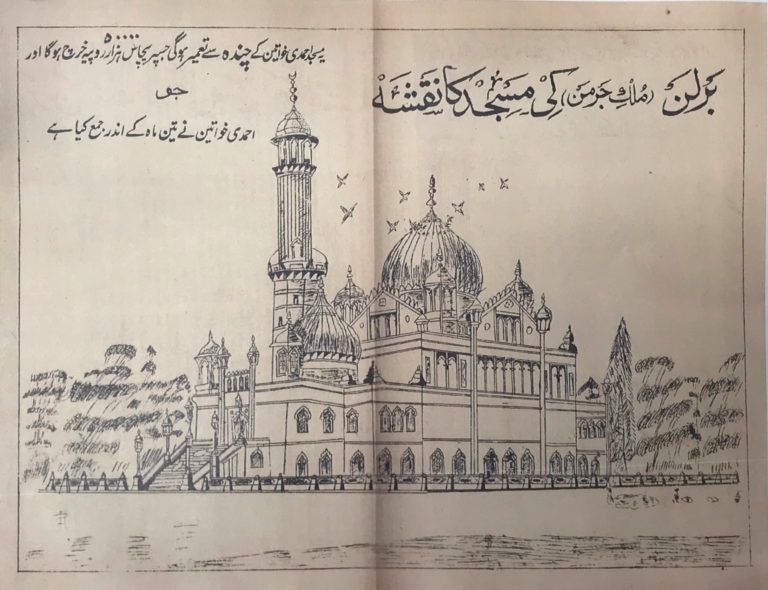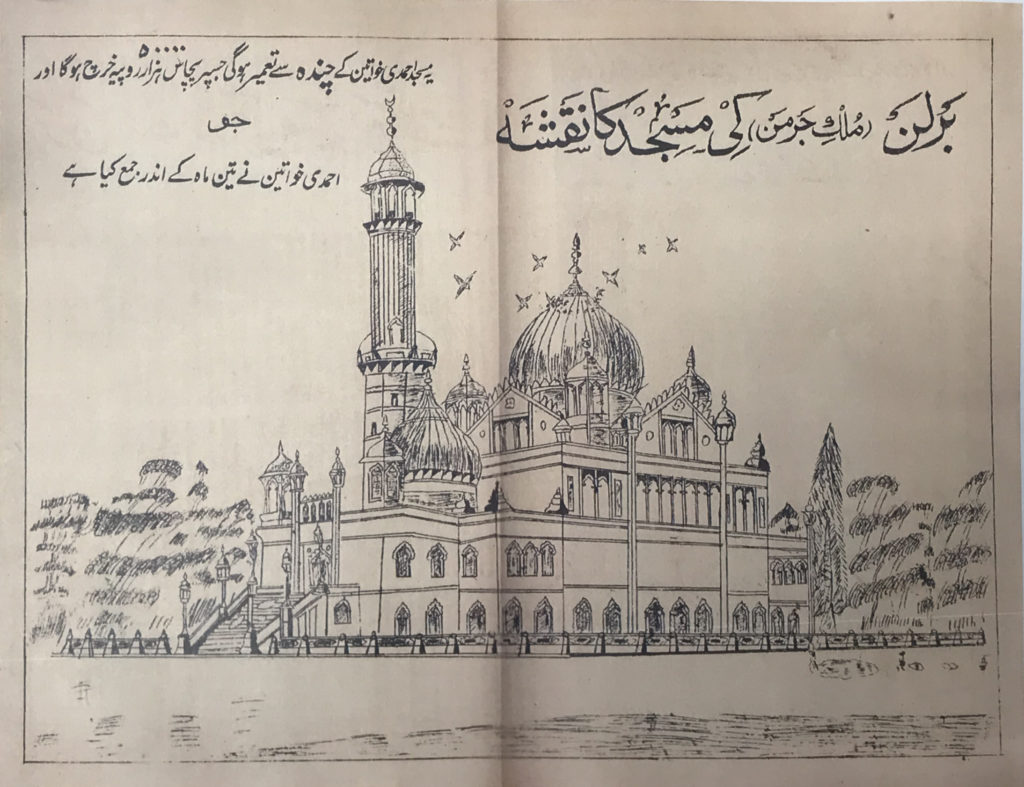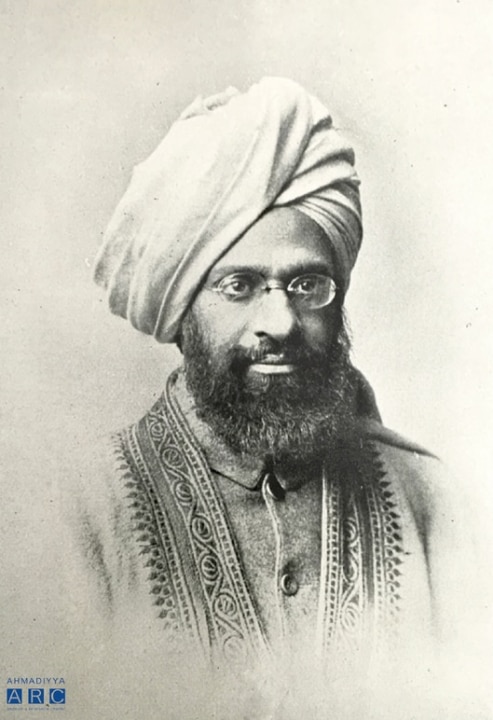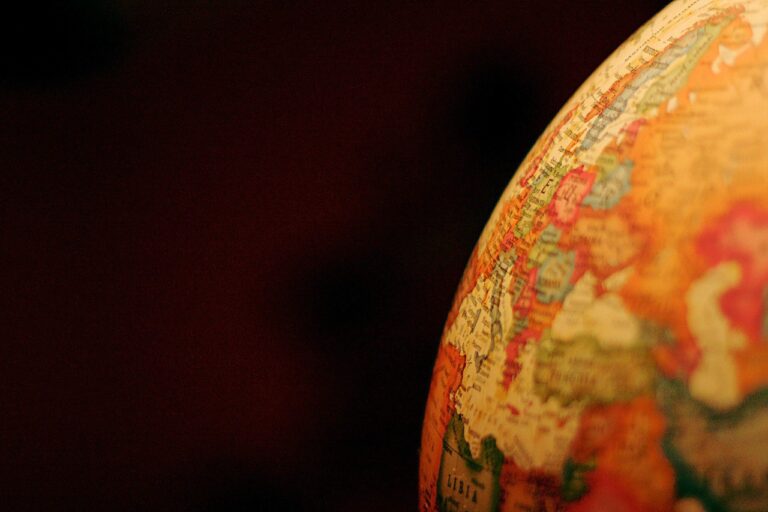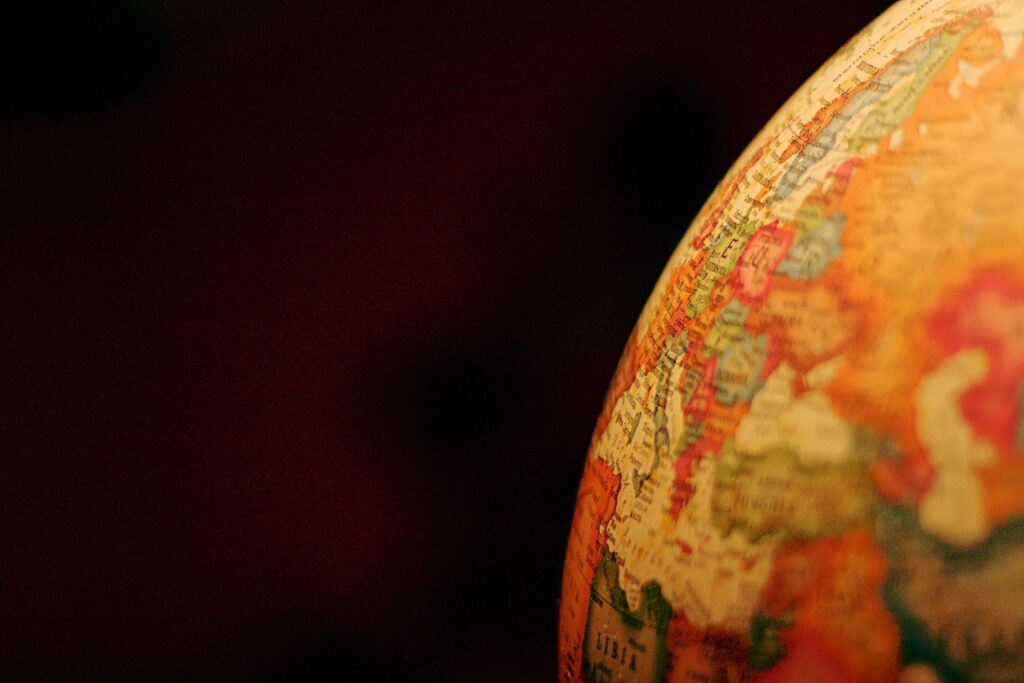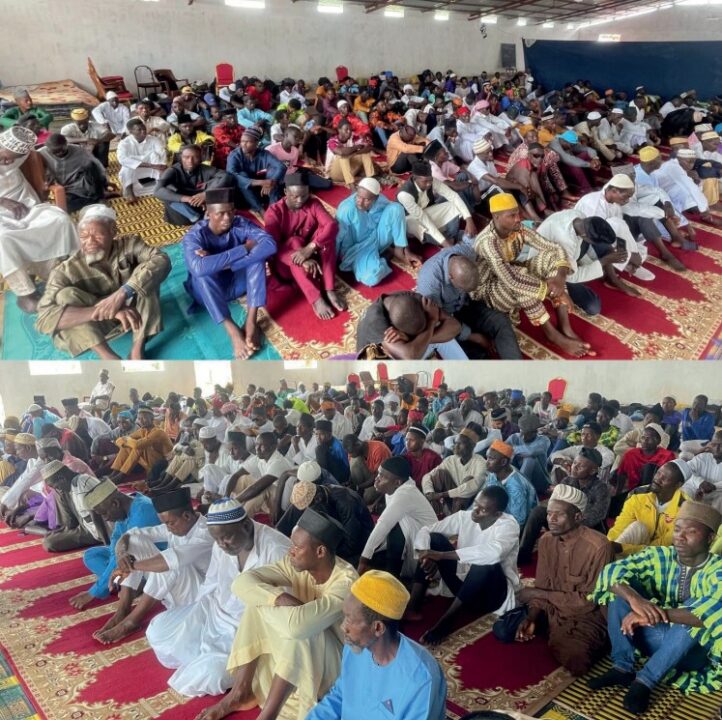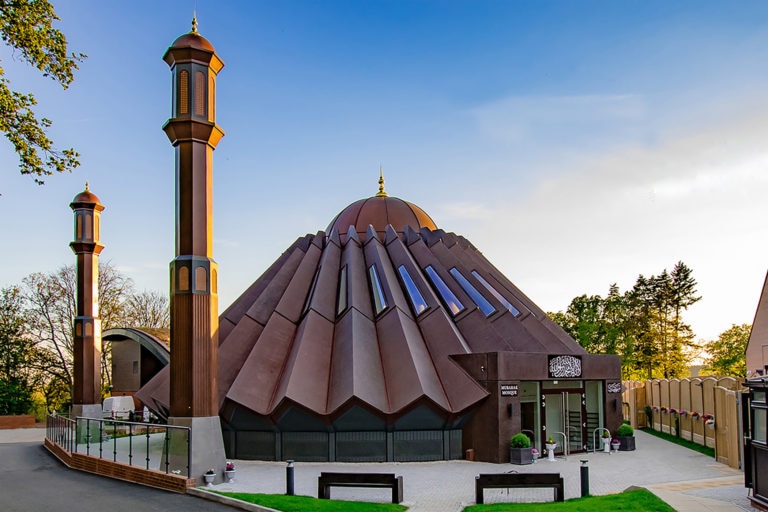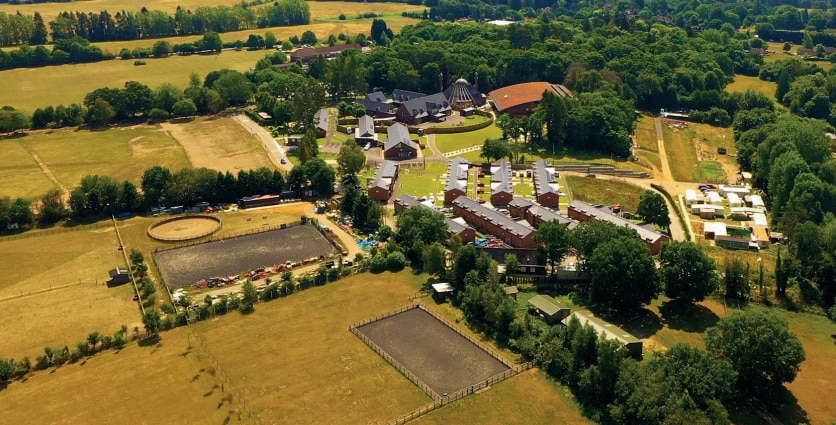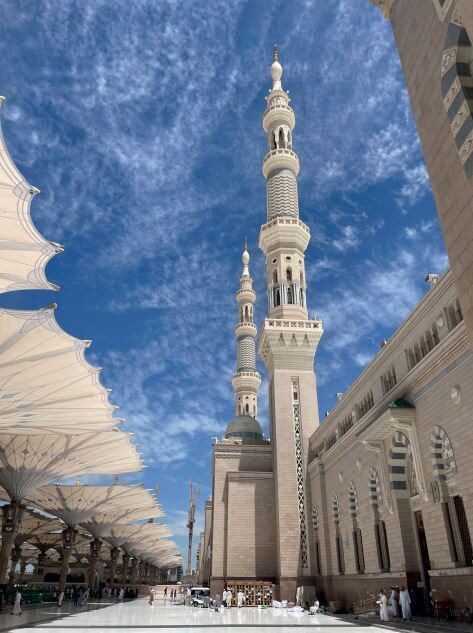Friday Sermon
29 September 2023
Muhammadsa: The Great Exemplar
After reciting the tashahud, ta‘awuz and Surah al-Fatihah, Hazrat Khalifatul Masih Vaa stated:
Accounts regarding the incidents that took place following the Battle of Badr were previously being mentioned. Through these accounts, we learn about the life and character of the Holy Prophetsa and also increase our knowledge of certain historical events. If one studies history [in detail], one is able to identify the erroneous narrations, which have portrayed a false image of Islam to others. The opponents of Islam take advantage of these incidents in order to defame Islam. On the other hand, extremist Muslims use this to fulfil their vested interests.
In any case, from the incidents I will present today, the first is that of ‘Umair bin Wahb, who travelled from Mecca to Medina following the Battle of Badr in order to kill the Holy Prophetsa and to avenge the defeat of the idolaters. However, the decree of Allah the Almighty manifested in such a way that he was granted the opportunity to accept Islam. Detailing this, it is recorded that Wahb bin ‘Umair was among the prisoners of Badr, who later accepted Islam and was captured by Rifa’ah bin Rafi’. Wahb’s father, ‘Umair bin Wahb, was one of the chiefs of the Quraish; who had caused a lot of pain to the Holy Prophetsa and his companions in Mecca. However, following the Battle of Badr, he became a Muslim. The details are as follows:
Prior to becoming a Muslim, ‘Umair and Safwan bin Umayyah were sitting in Mecca one day next to the Hateem. Safwan had not yet accepted Islam. Both of them were discussing the defeat of the Battle of Badr and also spoke about their prominent chiefs who had been killed during the battle. Safwan said: “By God! There is no joy to life after the killing of these chiefs.” Umair replied: “By God! You are right.” He added: “If I were not indebted to someone, which I am currently not able to pay off, and if I were not worried about my wife and children that would be left behind, who would be faced with poverty after my death, I would go to Muhammad[sa] and kill him. I even have a reason to confront him, since my son has been imprisoned by him.” Hearing this, Safwan vowed to take care of ‘Umair’s debt and said: “Leave your debt to me, I will pay it off. And your wife and children will stay with my wife and children. As long as they are alive, I take responsibility of their care and upbringing. Go and kill Muhammad[sa].” Hearing this, ‘Umair agreed to go and said to Safwan: “Keep our discussion a secret.” Safwan promised [that he would do so]. Following this, ‘Umair went home, took out his sword, sharpened it, dipped it in poison and set out from Mecca and reached Madinah. When ‘Umair reached Masjid Nabawi, Hazrat ‘Umarra was seated in a gathering with some other Muslims and discussing the Battle of Badr. As soon as ‘Umair sat his camel down at the doors of Masjid al-Nabawi [Mosque of the Prophetsa], Hazrat Umarra saw ‘Umair dismounting from his camel with a sword in his hand. Upon seeing this, Hazrat Umarra said: “The enemy of God, ‘Umair bin Wahb, has most certainly come here with bad intentions.” Following this, Hazrat Umarra immediately got up from there, went to the blessed room of the Holy Prophetsa and said: “O Messengersa of Allah! This enemy of God, ‘Umair bin Wahb, has come here with a drawn sword.” The Holy Prophetsa replied: “Bring him to me!” Hazrat Umarra went straight to ‘Umair, firmly grabbed the belt of his sword, hanging around ‘Umair’s neck and started walking with him.
Hazrat Umarra said to the Ansari Muslims present there, “Come in with me to the Holy Prophetsa and sit close to him, for I do not trust him.” Thereafter, Hazrat Umarra accompanied him to the Holy Prophetsa. When the Holy Prophetsa saw that Hazrat Umarra was coming in this manner, tightly holding Umair’s sword belt that was around his neck, he stated, “Umar, let him go.” He then said, “Umair, come close.” ‘Umair therefore approached him and greeted him with the custom of the days of ignorance, saying:
أَنْعمُوْا صَبَاحًا
The Holy Prophetsa replied, “Umair, Islam has gifted us a better manner of greeting than yours, which is the greeting of the dwellers of paradise. Tell me, why have you come?” ‘Umair replied, “I have come to discuss a prisoner (i.e., his son) who is in your captivity. My request is that you deal kindly in this regard.” Looking upon his unsheathed sword, the Holy Prophetsa asked, “Then what is the need for this sword?” ‘Umair answered, “May God destroy this sword. Have you left us in any worthy state? Did this sword do us any good previously?” The Holy Prophetsa then said, “Tell me the truth as to why you have come.” (He did not believe what he was saying.) ‘Umair replied, “In all honesty, I have not come for any other purpose than to discuss this prisoner.” It is then that the Holy Prophetsa stated, “No. In fact, you were sat one day by the Hateem with Safwan bin Umayyah speaking about the Quraish who had been killed at the Battle of Badr and were thrown in a pit. At that time, you said to Safwan that had it not been for your debt and concern for your wife and children, you would have gone to kill Muhammad. Safwan agreed to pay off your debt and take responsibility for your wife and children on the condition that you kill me.”
Allah the Almighty must have informed His Messengersa regarding what took place. It is mentioned in this narration that ‘Umair at once proclaimed, “I bear witness that you are the Messengersa of Allah. O Messenger of Allah, we used to deny what you received from heaven and the revelation revealed to you. As for this matter, at that time, there was no one present at the Hateem other than Safwan and I, nor did anyone know of our conversation. Therefore, by God, no one other than Allah the Almighty could have informed you of this. All praise belongs to Allah, Who has guided us towards Islam and enabled me to follow this path.” Umair then recited the Kalimah [Islamic creed].
The Holy Prophetsa said to the companions, “Teach your brother about the faith and the Holy Quran, and free the prisoner.” The companions acted upon these instructions at once. Hazrat ‘Umairra then said to the Holy Prophetsa, “O Messengersa of Allah, I spent all my time trying to extinguish the light of Allah, and vigorously persecuted those who had accepted His religion. I now desire for you to permit me to go to Mecca to call the people there towards Allah and invite them to Islam. Perhaps Allah Almighty will guide them. If not, then I shall torment them for their idol worship, just as I used to torment you and your companions for accepting Islam.” The Holy Prophetsa thus permitted him to go to Mecca. He did not permit him to go to cause them harm, but rather to preach to them. Hence, he returned to Mecca, and his son Wahb bin ‘Umair also accepted Islam.
After ‘Umair departed from Mecca, Safwan began telling the people, “I give you the glad tidings of an incident that shall take place very soon that will cause you to forget about the tragedy and woes of the Battle of Badr,” and Safwan would enquire from the incoming caravans about ‘Umair. Eventually, one caravan reached Mecca and informed Safwan that ‘Umair had accepted Islam. Safwan swore that he would never speak to him again, nor do any good to him. Thereafter, when ‘Umair reached Mecca (he had become Muslim by then), he did not go directly to Safwan’s house. Rather, he went straight to his own home to announce to his family that he had accepted Islam and to invite them to Islam. When news of this reached Safwan, he said, “I knew already why he went to his own home instead of to me. He has become an infidel and gone astray. I shall never speak to him from now on, nor shall his family ever derive any benefit from me.”
The idolaters considered their idolatry to be a religion, and the worship of the One God to be misguidance. This is the case nowadays as well. Then, ‘Umair went to Safwan bin Umayyah and proclaimed to him, “You are among our chiefs. You know full well that we used to worship the stones and offer sacrifices to them. Was that truly a religion? I bear witness that there is none worthy of worship except Allah, and Muhammadsa is the Messenger of Allah.” However, Safwan did not respond to what Umair said, nor did he pay any attention to him. (‘Ali bin Burhan al-Din al-Halabi, Al-Sirah al-Halabiyyah, Vol. 2 [Beirut, Lebanon: Dar al-Kutub al-‘Ilmiyyah, 2002], pp. 268-270)
Hazrat Mirza Bashir Ahmad Sahibra has mentioned this incident in Sirat Khatamun-Nabiyyin as follows:
“[…] the disbelievers of Mecca, who until now were fighting on the basis of apparent force and arrogance, now began to incline towards secret conspiracies, after facing defeat by the Muslims in an open arena. Hence, the following occurrence, which took place only a few days after Badr, is categorical evidence of this threat. As such, it is written that a few days after Badr, ‘Umair bin Wahb and Ṣafwan bin Umayyah bin Khalaf who were influential among the Quraish, were sitting in the courtyard of the Ka‘bah mourning the casualties of Badr.”
And they were speaking about the other matters that have already been mentioned. They were saying that life is no longer worth living and ‘Umair even said: “I am prepared to put my life in danger, but the thought of my children and debts restrains me. I also have an excuse to go there because my son is a prisoner there. If I go there I would kill Muhammad[sa].” (God-forbid). Nonetheless, after this, Safwan agreed to pay his debt and to look after his children, as has been mentioned already.
Following this Hazrat Mirza Bashir Ahmad Sahibra writes: “Umair boiled a sword in poison and set out from Mecca. When he reached Madinah, Hazrat Umarra who was very intelligent in such matters, became apprehensive. He immediately went to the Holy Prophetsa and informed him that ‘Umair had come and that he was apprehensive in this regard. The Holy Prophetsa instructed him to bring ‘Umair. Hazrat Umarra went to bring ‘Umair, but before leaving, he told the Companions that he was going to bring ‘Umair in order to meet the Holy Prophetsa, however, he doubted his intentions and they should go and sit with the Holy Prophetsa, and remain vigilant. After this, Hazrat Umarra brought ‘Umair and arrived in the presence of the Holy Prophetsa. The Holy Prophetsa kindly asked ‘Umair to sit next to him and inquired, ‘How have you come ‘Umair?’ ‘Umair responded, ‘My son has been made a prisoner at your hand. I have come to obtain his release.’ The Holy Prophetsa said, ‘Why then have you hung this sword upon your shoulder?’ He responded, ‘What do you ask of the sword? Did the swords do us any good at Badr?’ (He tried to respond in a clever manner). The Holy Prophetsa urged, ‘Tell me the truth as to why you have come.’ ‘As I have just mentioned,’ he said, ‘I have come to obtain the release of my son.’ The Holy Prophetsa said, ‘Well then, in other words, you have not hatched a conspiracy with Safwan in the courtyard of the Ka‘bah?” (The Holy Prophetsa hinted towards the plot) ‘Umair was thrown aback, but managed to regain himself and said, ‘I have made no such conspiracy.’ The Holy Prophetsa said, ‘Did you not conspire to kill me? But remember, God shall not afford you the ability to reach me.’ ‘Umair went into a state of deep reflection and said:
‘You speak the truth, we did in fact conspire as you have mentioned. It seems however, as if God is with you, Who has informed you of our intentions. For there was no third individual present among us when Safwan and I were discussing this matter. Perhaps Allah brought about this plan of ours in order to make me believe. I believe in you with a sincere heart.’
The Holy Prophetsa was pleased with the acceptance of ‘Umair and said to the Companions, ‘Now he is your brother. Instruct him in the teachings of Islam and release his prisoner.’Therefore, ‘Umair bin Wahbra became a Muslim and it was not long before he progressed distinctly in his faith and sincerity. Ultimately, he became so captivated by the light of truth that he urged the Holy Prophetsa to permit him to go to Mecca so that he could preach to the people there.
The Holy Prophetsa granted him permission and upon reaching Mecca, he secretly converted many people through his fervent preaching. Day in and day out, Safwan, waited anxiously to hear news of the assassination of the Holy Prophetsa, and would tell the Quraish to prepare for good news. However, when he witnessed this sight, he lost his mind.” (Sirat Khatamun-Nabiyyin, pp. 374-376)
After the Battle of Badr, some people became Muslim, but in reality they were hypocrites. Among them was Abdullah bin Ubayy bin Sulul. Commenting on verses 9 and 10 of Surah al-Baqarah, Allamah Ibn Kathir writes: “After the incident of Badr, when Allah the Almighty had granted supremacy to His Kalimah, honouring Islam and Muslims in the process, Abdullah bin Ubayy bin Sulul, who was the leader of the Banu Khazraj – and in the Era of Ignorance was the leader of both the tribes of the Aus and Khazraj – wished to rule over the people. (i.e. the people wished to make Abdullah bin Ubayy the leader). In one narration, it is mentioned that his people had even made the crown and were in the process of crowning him king when virtue descended (i.e. when the message of Islam reached) and people accepted Islam and overlooked him. For this reason, he resented Islam and its followers from the bottom of his heart. When the battle of Badr took place, he thought to himself that this message is beginning to take root and becoming stronger. Initially, he thought that they [Muslims] were few in number, but when the Muslims won the Battle of Badr, he became worried. Therefore, he seemingly accepted Islam. Following behind him, a group of his associates also accepted Islam. Some were from among the People of the Book.” (Ibn Kathir, Tafsir Ibn Kathir, Vol. 1, Under the verse: ‘Wa min al-Nas man Yaqulu…Wa ma Yash’urun’ [Beirut, Lebanon: Dar al-Kutub al-‘Ilmiyyah, 1998], p. 87; Mustafa ‘Abd al-Wahid, Subul al-Huda wa al-Rashad fi Sirat Khair al-‘Ibad, Vol. 3 [Beirut, Lebanon: Dar al-Kutub al-‘Ilmiyyah, 1993], p. 418)
With regards to this, Hazrat Mirza Bashir Ahmad Sahibra writes:
“Until now, many people from the tribes of Aus and Khazraj still stood firm upon polytheism. The victory of Badr resulted in a movement among these people and upon witnessing this magnificent and extraordinary victory, many people from among them became convinced of the truth of Islam. Thereafter, the element of idol worship began to diminish very rapidly in Madinah. However, there were also some in whose hearts this victory of Islam had sparked a fire of rancour and jealousy. Finding it unwise to oppose openly, apparently they accepted Islam, but from the inside they sought to uproot it and joined the party of the hypocrites. The most prominent among the latter class of people was ‘Abdullah bin Ubayy bin Sulul, who was a very renowned chieftain of the Khazraj tribe. Due to the arrival of the Holy Prophetsa to Madinah, he had already suffered the shock of having his leadership taken from him. After Badr, this individual became a Muslim at the outset, but his heart was satiated with malice and enmity towards Islam. He became the leader of hypocrisy and secretly began to hatch a series of conspiracies against Islam and the Holy Prophetsa. As such, it shall become evident from events, which unfolded hereafter that on certain occasions, this individual became a means of creating very delicate situations for Islam.” (Sirat Khatamun-Nabiyyin, pp. 376-377)
This entails a separate and detailed account.
Ghazwah Banu Sulaim or Qarqarat al-Kudr.
Just after a few days of returning from the Battle of Badr, the Holy Prophetsa learnt of the news that members of the Banu Sulaim and Banu Ghatafan had gathered at Qarqarat al-Kudr and were conspiring to launch an attack on Madinah. Qarqarat al-Kudr was the name of a spring located in a barren land. This area was situated in Najd on the route between Mecca and Syria and was 96 miles from Madinah. Upon receiving this news, the Holy Prophetsa made the decision to march towards the Banu Sulaim and the Banu Ghatafan and to completely frustrate their evil plans. The Holy Prophetsa took an army of 300 men and headed towards Qarqarat al-Kudr. There are varying opinions with regard to when they departed for this expedition. According to Ibn Ishaq, the Holy Prophetsa departed for this expedition on the 7th day upon returning from the Battle of Badr in 2 AH at the end of Ramadan or the beginning of Shawwal. In Al-Tabaqat by Ibn Sa’d it is written that the expedition of Banu Sulaim took place on 6th Jamadi al-Ula. According to Waqdi, this expedition took place in the middle of the month of Muharram in 3 AH. The narrations of Waqdi, however, are usually weak. This expedition was led by the Holy Prophetsa himself, and the flag of the Muslims was white and held by Hazrat Alira. (‘Ali bin Burhan al-Din al-Halabi, Al-Sirah al-Halabiyyah, Vol. 2, Ghazwat Sulaim [Beirut, Lebanon: Dar al-Kutub al-‘Ilmiyyah, 2002], p. 281; Ibn Sa’d, Al-Tabaqat al-Kubra, Vol. 2, Ghazwat Rasul Allah Bani Sulaim [Beirut, Lebanon: Dar al-Kutub al-‘Ilmiyyah, 1990], p. 27; Ibn Ishaq, Al-Sirah al-Nabawiyyah, Vol. 1, Ghazwat Sulaim [Beirut, Lebanon: Dar al-Kutub al-‘Ilmiyyah, 2004], p. 319; Al-Waqidi, Kitab al-Tarikh wa al-Maghazi, Vol. 1, Ghazwat Qararat al-Kudr [Beirut, Lebanon: ‘Alam al-Kutub, 1984], 182; Farhang-e-Sirat, p. 242, Mu’jam al-Buldan, Vol. 4, p. 501, Al-Munjid, p. 33, under ‘Bard’ and ‘Qarqar’, p. 624)
On this occasion, the Holy Prophetsa appointed Hazrat Abdullah bin Umm Maktumra as his deputy in Madinah. It is also mentioned that on this occasion, Hazrat Siba bin Urfutah Ghifarira was also appointed as his deputy in Madinah. One explanation for both of these narrations is that Hazrat Siwara was appointed as his deputy to deal with the administrative matters and just as it was the case in previous instances, Hazrat Abdullah bin Umme Maktumra was appointed to lead the prayers. (‘Ali bin Burhan al-Din al-Halabi, Al-Sirah al-Halabiyyah, Vol. 2, Ghazwat Sulaim [Beirut, Lebanon: Dar al-Kutub al-‘Ilmiyyah, 2002], p. 280)
In any case, when the Banu Sulaim and Banu Ghatafan suddenly learnt the news that a 300-strong Muslim army was approaching, they became terrified as they were not expecting this, and so they fled from there and took refuge in the mountaintops. (Ibn Sa’d, Al-Tabaqat al-Kubra, Vol. 2, Ghazwat Rasul Allah Bani Sulaim [Beirut, Lebanon: Dar al-Kutub al-‘Ilmiyyah, 1990], p. 26)
When the Holy Prophetsa along with his army, reached the valley of Kudr, he noticed the footprints of the camels and also a reservoir, however, he did not find a single person from among the enemy. (Al-Waqidi, Kitab al-Tarikh wa al-Maghazi, Vol. 1, Ghazwat Qararat al-Kudr [Beirut, Lebanon: ‘Alam al-Kutub, 1984], p. 182)
The Holy Prophetsa dispatched a group of companions towards the elevated area of the valley and he himself proceeded towards the heart of the middle of the valley without any resistance. The Holy Prophetsa came across some of the shepherds of the tribes and among them was someone called Yassar. The Holy Prophetsa enquired from him about the people of Sulaim and Ghatafan and he replied, “I have no knowledge about them. I simply provide water for the camels; some of them are given water on the fifth day and some are given water on the fourth day. The local people have ascended to the elevated area of the mountains where the water springs are located. We however have remained with the herd of camels and are not involved with them.” Since these people had come with the intention of war and these [camels] were part of their provisions, therefore the camels and the shepherds were taken captive. The Holy Prophetsa remained there for 3 nights – and according to another narration, he remained there for 10 days – but for however long the Holy Prophetsa remained there, no one had the courage to challenge the Holy Prophetsa. And so, without engaging in any battle, the Holy Prophetsa returned victorious. (Sharh al-Zurqani ‘ala al-Mawahib al-Laduniyyah, Vol. 2, Ghazwat Bani Sulaim [Beirut, Lebanon: Dar al-Kutub al-‘Ilmiyyah, 1996], p. 325)
In one narration it is mentioned that a total of 500 camels were acquired by the Holy Prophetsa as part of the spoils of war. Since these people had come with the intention of waging a war and had left their provisions and possessions there, therefore, as per the customary practices of the time, it was lawful to take possession of their wealth and they were deemed as spoils of war. The Holy Prophetsa separated one-fifth from it and distributed the remaining 400 camels amongst the Muslims. Each soldier was given 2 camels and this army comprised of 200 soldiers. Yassar, who was a shepherd, had come in the possession of the Holy Prophetsa and he subsequently freed him. The Holy Prophetsa remained outside of Madinah for 15 days during this expedition. (Mustafa ‘Abd al-Wahid, Subul al-Huda wa al-Rashad fi Sirat Khair al-‘Ibad, Vol. 4 [Beirut, Lebanon: Dar al-Kutub al-‘Ilmiyyah, 1993], 172)
The details of this incident have been written by Hazrat Mirza Bashir Ahmad Sahibra in Sirat Khatamun-Nabiyyin:
“…after the migration, the Quraish of Mecca toured the various tribes of Arabia and turned many of them into deadly enemies of the Muslims. Among these tribes, with respect to strength and number, the most noteworthy were two tribes residing in the central region of Arabia, known as Najd. Their names were Banu Sulaim and Banu Ghatafan. The Quraish of Mecca had especially tied these two tribes to themselves and incited them against the Muslims. As such, Sir William Muir writes:
‘The Coreish [sic] now turned their eyes towards this territory [i.e., Najd], and entered into closer bonds with the tribes inhabiting it. Henceforth the attitude of the Bani Suleim [sic] and Ghatafân, especially of the former, became actively hostile towards Mahomet [sic], which took on a physical form. Incited by the Coreish, and by the example of Abu Sofian, [sic] they now projected a plundering attack upon Medina.’”
He is an orientalist, but despite this he accepted that they all joined forces and wanted to attack Medina. Therefore, they were treated in the same manner and whatever spoils of war were gained was lawful. Nonetheless, Hazrat Mirza Bashir Ahmad Sahibra further says:
“Thus, when the Holy Prophetsa returned from Badr, it had only been a few days since his arrival in Medina, when he received news that a large army consisting of the tribes of Sulaim and Ghatafan were assembling in Qarqarat al-Kudr with the intention of attacking Medina. The arrival of this intelligence so promptly after the Battle of Badr demonstrates that when the army of the Quraish set out from Mecca with the intention of attacking the Muslims, at the very same time the chieftains of the Quraish must have relayed a message to the tribes of Sulaim and Ghatafan, urging them to attack Medina from the opposing front. It is also possible that when Abu Sufyan slipped away and escaped with his caravan, by means of an emissary, etc., he may have urged these tribes to go forth against the Muslims. In any case, the Holy Prophetsa had only just arrived in Medina after becoming free from the Battle of Badr, when the horrific news was received that the tribes of Sulaim and Ghatafan were about to wage an onslaught against the Muslims. Upon receiving this news, as a pre-emptive measure, the Holy Prophetsa immediately assembled a force of the Companions and set out towards Najd.
However, after undertaking an arduous journey of many days, when the Holy Prophetsa reached the Qirqirah, (i.e., the desolate plain) of a place known as Al-Kudr, he found that upon receiving news of the imminent arrival of the Muslims, the people of the Banu Sulaim and Banu Ghatafan had taken refuge in the nearby mountains. The Holy Prophetsa dispatched a detachment of Muslims in search of them and proceeded to the heart of the valley himself, but no trace of them could be found. Albeit, they were able to find a large herd of camels grazing in the nearby valley, which belonged to them, and according to the laws of warfare, the companions seized it; thereafter the Holy Prophetsa returned to Medina. The shepherd of these camels was a slave named Yassar, who had been taken captive along with the camels. The company of the Holy Prophetsa so deeply influenced this person that after a short period of time, he became a Muslim. Although, according to custom, the Holy Prophetsa freed him as an act of benevolence, he still did not leave the service of the Holy Prophetsa until his last breath.” (Sirat Khatamun-Nabiyyin, pp. 452-453)
Regarding the first Eid al-Fitr of Muslims which took place in Shawwal 2 AH, it is recorded that in the second year after migration, upon the completion of the month of Ramadan, the Holy Prophetsa offered the first Eid al-Fitr. (Da’irah Ma’arif Sirat Muhammad Rasul Allah, Vol. 6 [Lahore: Dar al-Ma’arif, 2022], p. 362)
The Holy Prophetsa asked, “What is the reality and significance of the two days you celebrated during the era of ignorance?” The people living there responded, “we celebrated festivals just as is common today.” The Holy Prophetsa said, “Allah the Almighty has ordained for you two days better than those festivals.” The Companions intently asked, “What days are those, O Messengersa of Allah?” The Holy Prophetsa responded, “Eid al-Fitr and Eid al-Adha. During these days, no one should keep a fast, rather they should eat, drink and rejoice.” On both of these days, the Holy Prophetsa would go to the site for Eid prayers, which was located towards the eastern part of Medina. On the day of Eid, the Holy Prophetsa would head to the prayers using one route and would return home from a different route. In this way, a large congregation would form and this would strike awe into the hearts of the non-Muslims. On one occasion the Holy Prophetsa led the Eid prayer in Masjid Nabawi, because on that occasion, it rained heavily. (Qasim Mahmood, Sirat al-Nabisa ka Encyclopedia, Vol. 1 [Lahore: Maktabat al-Faisal, 2014], p. 411)
Regarding this Eid al-Fitr, Hazrat Mirza Bashir Ahmad Sahibra writes:
“At the end of Ramadan, after the fasting of Ramadan had been ordained, the Holy Prophetsa issued the injunction of Sadaqatul-Fitr, according to divine command. Every Muslim who possessed the capacity to do so was enjoined to contribute one Sa‘ of dates, grapes, barley or wheat, etc., per person on behalf of himself, his family and dependents, as charity prior to Eid. This charity was distributed among the poor, needy, orphans and widows, etc., so that this may serve as an expiation for any lapses which may have occurred during the worship of fasting and a means of aid may be arranged for the poor on the occasion of Eid. As such, according to the command of the Holy Prophetsa, prior to every Eid at the end of Ramadan, Sadaqatul-Fitr was formally collected from every young and old Muslim man and woman, and distributed among the orphans, poor and needy.”
It was in this very year that Eid al-Fitr began as well. In other words, the Holy Prophetsa ordered that upon the completion of the month of Ramadan, the Muslims should celebrate Eid on the first of Shawwal. This Eid was in the joy that Allah the Exalted had granted them the ability to offer worship in Ramadan. However, it is immensely fascinating that even for the expression of this joy, the Holy Prophetsa prescribed a worship. As such, he ordered that on the day of Eid, all the Muslims should congregate in an open space and offer two Rak‘at of Salat. Then, after this Salat, the Muslims should of course, express their outward joy as well, because when the soul experiences joy, it is a right for the body to partake of it as well. In actuality, Allah the Almighty has placed an Eid at the end of all those significant forms of worship which are observed collectively. The Eid of the Salat is the Friday Prayer service, which arrives after the observance of Salat for one week. This has been referred to as the most superior of all the festivals of Eid. Then, the Eid of fasting is Eid-ul-Fitr, which arrives at the close of Ramadan. The Eid of Hajj is Eid-ul-Adha, which is celebrated on the second day of Hajj. All of these festivals of Eid are a form of worship in themselves. Therefore, the festivals of Eid in Islam possess a wonderful magnificence, and substantial light is shed upon the reality of Islam. One receives an opportunity to contemplate as to how Islam wishes to bind every action of the Muslims to the remembrance of Allah.”
Hence, this is the importance of the Eid festivals, wherein we should not merely celebrate but also remember Allah the Almighty and engage in worship. Hazrat Mirza Bashir Ahmad Sahibra continues:
“I would have to divert from history, otherwise I would discuss how Islam has made the remembrance of God an inherent part of a Muslim’s every movement, repose, word and action. This is true to the extent that even insignificant actions in our daily lives are tied to remembering God, whether it be to stand or sit, to sleep or wake, to eat or drink, to wash and bathe, to change clothes, to wear shoes, to exit or enter your home, to begin or return from a journey, to sell or purchase something, to ascend or descend an incline, to enter or exit a mosque, to meet a friend, to face an enemy, to see a new moon, or to go unto your wife. In short, every action from beginning to end – even upon sneezing or yawning – has been in some way linked to the remembrance of God.”
Thus, this is the true teaching of Islam – to be mindful of Allah the Almighty at all times and in all matters – which every true Muslim should keep in view.
“It is no surprise that in such a state, the Arab disbelievers remarked regarding the Holy Prophetsa – who actually brought this teaching, or according to the disbelievers, who conjured it – that he was madly in love with God. In truth, a worldly person cannot consider such sentiments as anything other than madness, however, anyone who has understood truly the reality of their existence knows that this is the very meaning of life.” (Sirat Khatamun-Nabiyyin, pp. 337-338)
The true essence of life is in always remembering God Almighty.
During the time between the Battle of Badr and the Battle of Uhud, two incidents have been mentioned which are improbable. Even if one takes a cursory glance at these incidents, it is clear and evident that they have been fabricated. The first incident is the murder of Asma bint Marwan. It is said that she was killed, and in context to this incident, there is also mention of Hazrat Umair bin Adi Khitmira who was a blind companion [of the Holy Prophetsa]. Hazrat Umairra was the first Muslim among the Banu Khitma tribe. In the second year following the migration when five nights remained in the month of Ramadan, the Holy Prophetsa sent Umair bin Adi Khitmira to Asma bint Marwan, a Jewish woman married to Marsad bin Zaid bin Hisan Ansari, who had accepted Islam. It is alleged that the order to kill Asma bint Marwan was given because she maligned Islam that he was sent because she used vulgar language against Islam and that she incited people against the Holy Prophetsa, and would recite derogatory poetry.
According to one narration, this woman would throw dirty clothes into the Prophet’s Mosque. In order to lend support to this tale, it was also mentioned in the narration that through these means, she would cause pain to the Holy Prophetsa and the Muslims. According to this narration, Hazrat Umairra entered her home in the darkness of night upon the Holy Prophet’ssa instruction. Her children were sleeping around her and she was feeding milk to one of her children. Umairra checked to see where she was and took the child away from her. He drew his sword to her chest and thrust it into her with full force, piercing through her back. Following this, Umair bin Adira returned to Medina and offered the morning prayer being the Holy Prophetsa. When the Holy Prophetsa concluded his prayer and stood up, his eyes found Umairra. The Holy Prophetsa asked him if he had killed Marwan’s daughter, and he replied in the affirmative, inquiring, “Will I be charged with the sin of her murder?” This is what he asked at this time. On one hand, it is reported that the Holy Prophetsa had sent him, and on the other hand, he is asking if he would be held accountable for the killing. The Holy Prophetsa responded by saying an uncommon Arabic proverb:
لَا يَنْتَطِحُ فِيها عَنْزَانِ
“Even two goats would not quarrel over this matter.” That is, the murder of that woman was such an insignificant matter that even an opponent would not object to it. It is recorded that this proverb was never said by anyone other than the Holy Prophetsa. It is found only in this single narration. Nonetheless, following this incident, the Holy Prophetsa gave Umairra the name of “Basir”, which means the one who possesses sight. Hazrat Umar bin al-Khattabra remarked, “Observe how this blind man spent his night in the obedience of God.” The Holy Prophetsa responded, “Do not call him blind, rather, call him “Basir.”
In another narration, the murder of Asma is mentioned in the following manner. When the Holy Prophetsa decided that Asma bint Marwan should be killed, he asked the people, “Is there anyone who will rid us of this woman?” Upon this, Umair bin Adi said, “I will take the responsibility of completing this task.” After this, he went to her at a time when she was selling dates. Pointing to the dates before him, he asked her, “Do you have any dates that are better than these?” She replied in the affirmative and then went into her home and bent down to pick up some dates. Umair looked to the right and left, then struck her on the head and killed her. It was then that the Holy Prophetsa stated, “If you desire to see a man who helped Allah and His messenger, look to Umair bin Adi.”
In another narration, it is mentioned that when the Holy Prophetsa decreed it lawful to kill Asma bint Marwan, Hazrat Umairra swore an oath that if Allah the Almighty brought the Holy Prophetsa safely back to Medina after the Battle of Badr, he would kill Asma. He intended to kill her after returning from the battle. When the Holy Prophetsa returned to Medina after being victorious at Badr, Hazrat Umairra went to Asma’s house and killed her to fulfil his oath. According to another narration, when Hazrat Umairra returned to his neighbourhood after killing Asma bint Marwan, her son was burying his mother with a group of others. Upon sighting Umair, they asked him if he had killed her. He replied in the affirmative and then said:
فَكِيْدُوْني جَمِيْعًا ثُمَّ لاَ تُنْظِرُوْنِ
He also said, “All of you, plot against me and give me no respite. I swear by He Who has control over my life, even if all of you join together and begin to utter the words this woman did, I will begin to sever all your necks until either I attain martyrdom or send you to hell.” From that day onwards, Islam spread through the Banu Khitma tribe, for until then, those who had accepted Islam from among them would conceal their faith.
Allamah Suhaili writes that the one to kill Asma was her husband. In Al-Isti’ab, in reference to Hazrat Umairra, it is written that he also killed his sister because she used to slander the Holy Prophetsa. However, in Al-Isti’ab the name of Umair’s sister is not mentioned. (‘Ali bin Burhan al-Din al-Halabi, Al-Sirah al-Halabiyyah [translation], Vol. 3 [Lahore: Dar al-Isha’ah, 2009], pp. 482-485; Mustafa ‘Abd al-Wahid, Subul al-Huda wa al-Rashad fi Sirat Khair al-‘Ibad, Vol. 6 [Beirut, Lebanon: Dar al-Kutub al-‘Ilmiyyah, 1993], p. 21)
So, this is the entire incident which has been narrated. This incident is mentioned in some books of history, however, it is not mentioned in any of the six authentic books of Ahadith or any other authentic book of traditions. The reality is that not only did some people in later times include such fictitious and fabricated incidents in their books but they even started to use them as justifications for their punishments of blasphemy against the Prophetsa. This is exactly what today’s clerics do, they take this point and use it as an argument in favour of killing anyone who dishonours the Holy Prophetsa, whereas there is no such punishment in Islamic law for dishonouring the Holy Prophetsa, nor do such incidents bear any truth.
For example, when we critically study this incident, it becomes apparent that firstly, this narration is weak on account of its authenticity and Allama Albani has rendered this to be a fabricated narration. As such, in his book “Silsilatul Ahadith Da’ifah wal Maudu’ah”, Allama Nasiruddin Albani writes that one of its narrators is Muhammad bin Umar Waqidi who is a liar and fabricator, and Ibn Mu’in has declared him to be a weak narrator. (Silsilat al-Ahadith al-Da’ifah wa al-Maudu’ah, Vol. 13 [Riyad: Maktabat al-Ma’arif, 2004], pp. 34-35, Riwayat 6013)
When rationally analyse the events of this narration, there are many questions that arise. For example, how did the Companion reach this woman’s home on his own despite being blind? They may claim that he had visited the path before, or had frequently gone there and so he was able to estimate the path along his way, but then how was it that he went alone at night, arrived directly at the door, went inside and found the woman? How did he know that her children were sleeping around her? If one says he felt around for each of them, but then how could it be that as he was feeling around nobody woke up? How did he also figure out that she was feeding her child? Then, how was it that upon realising she was being attacked, she did not try to save herself from the blind man or put up a fight?
According to the narration, the assailant forcibly removed the child who was being fed. Despite him being blind, the woman who could see did not cry out or resist. Her husband was also sleeping there, was he not aware of anything? Above all, how did the blind Companion discern who was there without calling out? Usually, visually impaired people recognise others by their voice, therefore how could he be certain that it was indeed Asma bint Marwan.
Furthermore, there are varying narrations in relation to this incident. In another narration, it is mentioned that when the woman went inside to get some dates, the Companion looked around but did not see anyone. This is something to think about, because the Companion was blind. How could he have been looking around and claimed that he did not see anyone? Did he see the dates that were there in order to be able to say that the dates were not ripe? Someone could say that he felt them with his hands and that can be accepted, but that still puts doubt on the the matter of him looking around.
In one narration it is recorded that when the Companion went to the Holy Prophetsa after killing the woman and informed him about this, he returned to the same place and found the woman’s sons burying her. This is also something to consider; how is it possible that he had just killed her, and in such a short span of time her sons came to bury her and all the matters were tended to in such a short period of time? Aside from this, there has been some research carried out from our perspective, that I will mention: there are other discrepancies that prove this incident to be fictitious and fabricated; most narrations mention the woman’s name being Asma bint Marwan, whereas according to the author of Al-Isti’ab, she was not Asma, rather she was Umair’s sister Bint Adi. (Ibn ‘Abd al-Barr, Al-Isti‘ab fi Ma’rifat al-Ashab, Vol. 3, Dhikr Umair bin Adiyy al-Khitmi [Beirut, Lebanon: Dar al-Kutub al-‘Ilmiyyah, 2002], p. 291)
Secondly, in most instances, the assailant’s name is recorded as Umair bin Adi, however, there are other instances where it is recorded as Amr bin Adi. (Ibn Hazm, Jawami’ al-Sirah [Beirut, Lebanon: Dar al-Kutub al-‘Ilmiyyah, 2003], p. 19)
According to Ibn Duraid the assailant’s name was Ghishmir. (Sharh al-Zurqani ‘ala al-Mawahib al-Laduniyyah, Vol. 2 [Beirut, Lebanon: Dar al-Kutub al-‘Ilmiyyah, 1996], p. 342)
According to some other narrations, none of these was the assailant’s name, rather someone from among the woman’s own tribe killed her when she was selling dates. (Sharh al-Zurqani ‘ala al-Mawahib al-Laduniyyah, Vol. 2 [Beirut, Lebanon: Dar al-Kutub al-‘Ilmiyyah, 1996], p. 344)
According to Ibn Sa’d, the murder took place in the middle of the night, whereas in Zurqani’s narration, it is recorded as happening during the day or in the evening, because according to the narration, the target was selling dates at the time. (Ibn Sa’d, Al-Tabaqat al-Kubra, Vol. 2 [Beirut, Lebanon: Dar al-Kutub al-‘Ilmiyyah, 1990], p. 21; Sharh al-Zurqani ‘ala al-Mawahib al-Laduniyyah, Vol. 2 [Beirut, Lebanon: Dar al-Kutub al-‘Ilmiyyah, 1996], p. 344)
There are also discrepancies regarding how the crime was committed; whether she was strangled, stabbed in the stomach with a dagger, whether she was killed at night as she slept or whether under the pretence of purchasing dates from her, she was followed to her home and then strangled.
Then, according to Sirat Ibn Hisham, she became a hypocrite when Abu Afak was killed. This indicates that she was previously a Muslim and became a hypocrite upon hearing about the killing of Abu Afak. If she was a Muslim before this, then how could she have written blasphemous poetry about the Holy Prophetsa and disrespect the mosque? According to the narration by Waqidi, Umair said, “O Allah, I have taken upon myself a vow for Your sake. If I return to Medina with the Holy Prophetsa, then I will certainly kill her”. However, according to the author of Dairah Ma’arif Sirat Muhammad Rasulullahsa he was blind, due to which he could not partake in the Battle of Badr. It is with reference to this incident that the same author has mentioned Waqidi’s conflicting statement that despite being blind he used to take part in Jihad. (Da’irah Ma’arif Sirat Muhammad Rasul Allah, Vol. 6 [Lahore: Dar al-Ma’arif, 2022], pp. 428-429; Al-Waqidi, Kitab al-Tarikh wa al-Maghazi, Vol. 1 [Beirut, Lebanon: Dar al-Kutub al-‘Ilmiyyah, 2013], p. 121)
They themselves mix up false narrations. If this incident is not fictitious and fabricated, then why have books of history such as Tarikh al-Tabari, Tarikh Ibn Kathir and others not mentioned it?
It has only briefly been mentioned in certain books, such as Al-Tabaqat al-Kubra by Ibn Sa’d etc. There are some who have briefly mentioned this incident, however, Waqidi has mentioned it in some detail. This incident is not mentioned in books of Hadith, whereas the authors of books of Hadith have included all narrations which have been attributed to the Holy Prophetsa. Why then has this incident not been included? Then, according to this narration, if the Holy Prophetsa himself sent the Companion to kill this woman, then why did the Companion go on to ask the Holy Prophetsa whether he would be punished for killing her, as I mentioned before?
If this incident had taken place, then the Jewish people would have surely claimed that the Muslims had broken their treaty by killing Asma bint Marwan and sought to disturb the peace of Medina. However, historians such as [the writers of] Al-Raud al-Unuf and Tarikh al-Tabari agree that the first conflict between the Muslims and the Jewish people was the Expedition of Banu Qaynuqa. (Ibn Hisham, Al-Raud al-Unuf fi Tafsir al-Sirah al-Nabawiyyah, Vol. 3 [Beirut, Lebanon: Dar al-Kutub al-‘Ilmiyyah, 2013], p. 225; Muhammad Ibn Jarir al-Tabari, Tarikh al-Tabari, Vol. 2 [Beirut, Lebanon: Dar al-Kutub al-‘Ilmiyyah, 2012], p. 48)
Hence, there was no such reaction by the Jewish people. As such, these factors prove this incident to be highly doubtful, in fact, it is completely false. Extremist clerics have given importance to these incidents, thereby defaming the beautiful teachings of Islam. Today, they fabricate similar stories in order to carry out their extremist activities against Ahmadis, and these clerics incite others as well.
The second incident is similar to this one. I will mention it in the future, God-willing. That is also clearly proven to be false.
(Official Urdu transcript published in the Daily Al Fazl International, 20 October 2023, pp. 2-7. Translated by The Review of Religions.)
